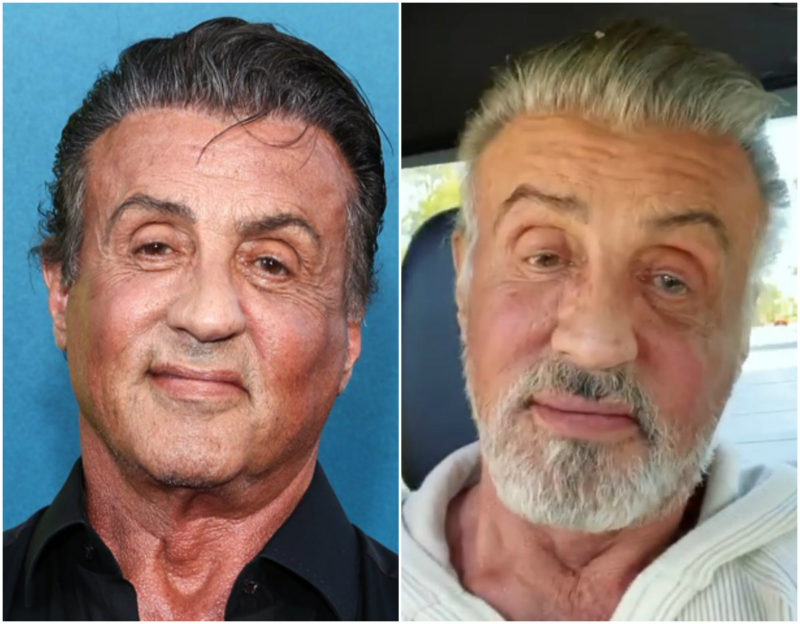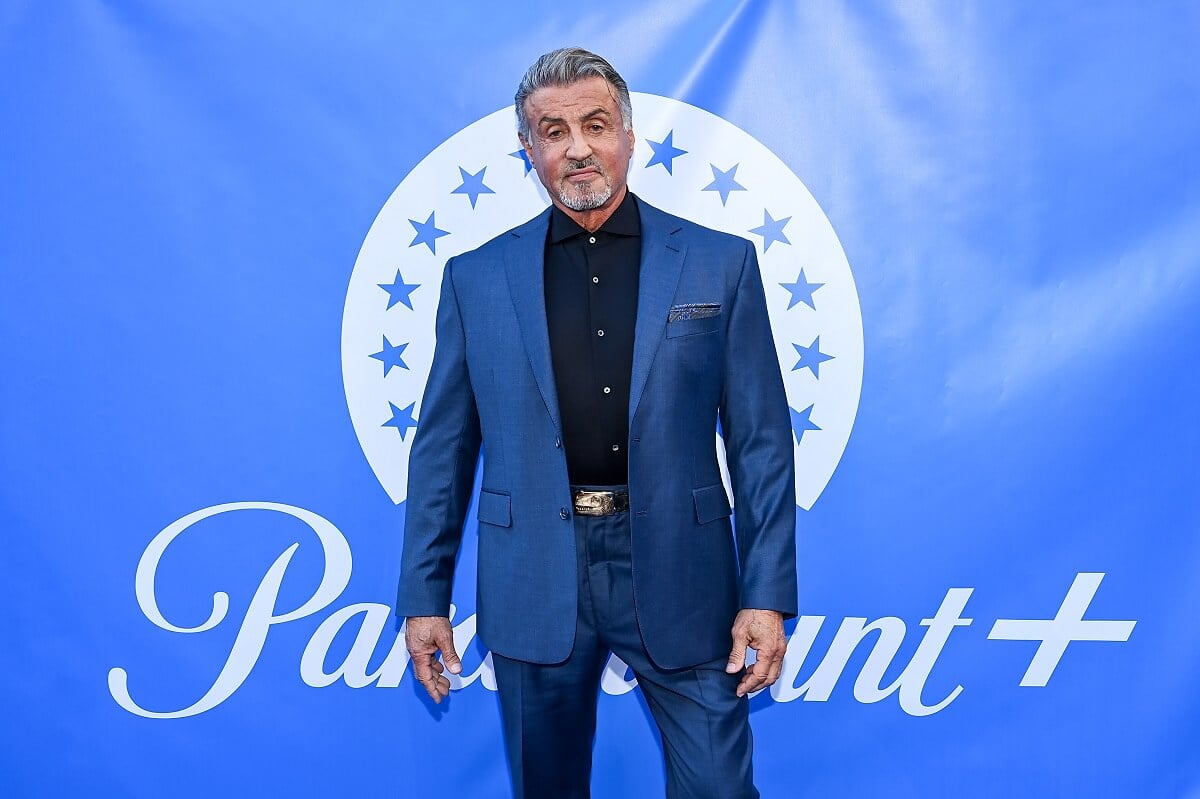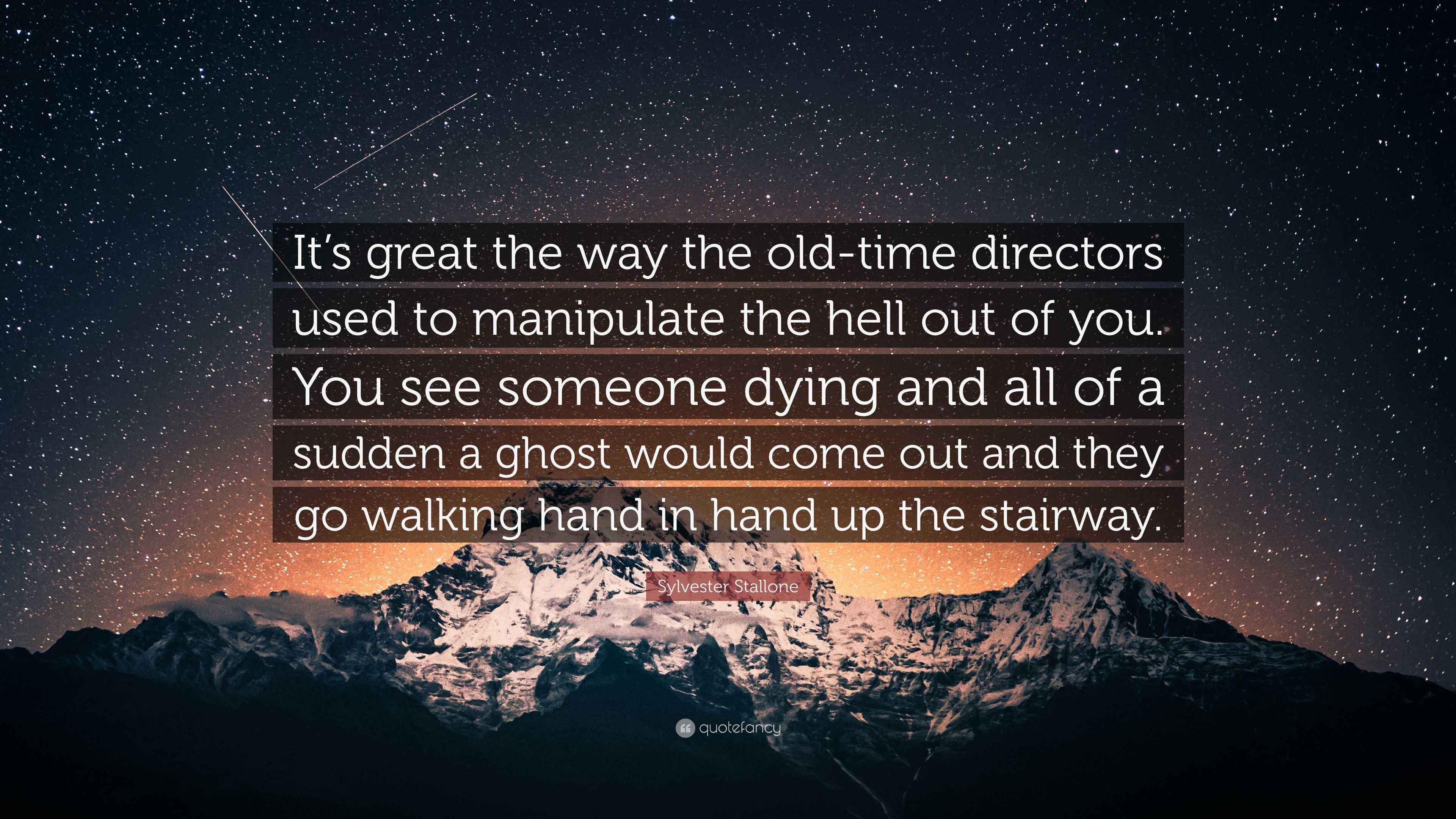Stallone's Life In Peril: Dying Rumors Haunt Legendary Actor
Is Sylvester Stallone Dying?
Sylvester Stallone is not dying. Rumors of his death have been circulating online for years, but they are unfounded. Stallone is alive and well.
The rumors of Stallone's death began in 2016, when a fake news story claimed that he had died of a heart attack. The story was quickly debunked, but it continues to circulate online.
- Meet The Inspiring Stephanie Tyler Jones An Advocate For Social Justice
- 5movierulz 2023 Download Your Ultimate Guide To Movie Streaming And Downloads
There are several reasons why people might believe that Stallone is dying. He is 76 years old, and he has had some health problems in the past. However, he is still active and healthy, and there is no reason to believe that he is in danger of dying.
The rumors of Stallone's death are a reminder of the importance of being critical of the information that we see online. We should not believe everything that we read, and we should always check the source of the information before we share it.
Sylvester Stallone Dying
Introduction
The recent rumors surrounding Sylvester Stallone's death have sparked widespread concern and speculation. While the actor is alive and well, the persistence of these rumors warrants an exploration of their origins, impact, and the importance of responsible media consumption.Key Aspects
- Misinformation and Fake News: The spread of false information through unreliable sources has contributed to the rumors.
- Celebrity Culture and Sensationalism: The fascination with celebrity gossip and the tendency to sensationalize news stories have fueled the rumors.
- Social Media and Echo Chambers: Social media platforms often create echo chambers, where unverified information can circulate rapidly and gain traction.
{point}
Introduction: Misinformation and the proliferation of fake news have played a significant role in perpetuating rumors about Stallone's death.Facets:- Unverified Sources: Rumors often originate from unreliable sources, such as anonymous blogs or social media posts.
- Sensational Headlines: Attention-grabbing headlines designed to evoke strong emotions can contribute to the spread of misinformation.
- Confirmation Bias: People tend to seek out information that confirms their existing beliefs, leading them to believe rumors without critical evaluation.
{point}
Introduction: The intense public interest in celebrities and the tendency to sensationalize news stories have fueled the rumors about Stallone's death.Facets:- Celebrity Obsession: The media's focus on celebrities' personal lives and the fascination with their every move can create an environment where rumors thrive.
- Sensationalized Reporting: News outlets may exaggerate or embellish stories about celebrities to attract readers and viewers.
- Paparazzi Culture: The relentless pursuit of celebrities by paparazzi can create a sense of urgency and contribute to the spread of rumors.
{point}
Introduction: Social media platforms and the formation of echo chambers have contributed to the rapid spread and persistence of rumors about Stallone's death.Facets:- Filter Bubbles: Social media algorithms often create filter bubbles, where users are exposed to content that aligns with their existing views.
- Confirmation Bias: Within echo chambers, individuals tend to reinforce their own beliefs and are less likely to encounter opposing viewpoints.
- Viral Misinformation: False or misleading information can spread rapidly through social media due to its shareability and the tendency for users to trust content shared by their connections.
Sylvester Stallone Dying
The rumors surrounding Sylvester Stallone's death have highlighted several key aspects related to misinformation, celebrity culture, and the role of social media.
- Leighton Meesters Sizzling Allure Unveiling The Enchanting Charisma
- Fabrizio Romano Unveiling The Net Worth Of A Football Transfer Icon
- Misinformation and Fake News
- Celebrity Obsession and Sensationalism
- Social Media Echo Chambers
- Critical Thinking and Media Literacy
- Responsible Journalism and Ethics
- The Impact of Rumors on Public Perception
These aspects are interconnected and contribute to the spread and persistence of false information. Misinformation and fake news thrive in environments where people are more likely to believe sensational headlines and unverified sources. Celebrity culture and the obsession with personal lives create a fertile ground for rumors. Social media echo chambers further amplify and reinforce these rumors, making it difficult for accurate information to reach the public.
Countering these challenges requires critical thinking and media literacy. Individuals need to be able to evaluate the credibility of sources, identify biases, and seek out diverse perspectives. Responsible journalism and ethical reporting are also crucial in combating misinformation. News outlets have an obligation to verify information and avoid sensationalism. Finally, addressing the impact of rumors on public perception is important. Rumors can damage reputations, create unnecessary anxiety, and undermine trust in institutions.
| Name | Birth Date | Birth Place |
|---|---|---|
| Sylvester Stallone | July 6, 1946 | New York City, New York, U.S. |
Misinformation and Fake News
Misinformation and fake news have played a significant role in the spread of rumors about Sylvester Stallone's death. False or misleading information, often originating from unreliable sources, can quickly gain traction and spread through various channels, including social media and traditional media outlets.
- Unverified Sources: Rumors about Stallone's death often originate from anonymous blogs, social media posts, or websites with questionable credibility. These sources may lack proper journalistic standards and may intentionally or unintentionally spread false information.
- Sensational Headlines: Attention-grabbing headlines designed to evoke strong emotions are commonly used to spread fake news. These headlines may exaggerate or distort the truth to attract clicks and shares, contributing to the spread of misinformation.
- Confirmation Bias: People tend to seek out information that confirms their existing beliefs, making them more likely to believe rumors that align with their prior assumptions. This confirmation bias can contribute to the spread of misinformation, as individuals may be less critical of information that supports their existing views.
- Social Media Echo Chambers: Social media platforms can create echo chambers, where users are exposed to content that reinforces their existing beliefs and are less likely to encounter opposing viewpoints. This can lead to the spread of misinformation, as users may be less likely to question or critically evaluate information shared within their echo chamber.
The spread of misinformation and fake news can have serious consequences, including damage to reputations, unnecessary anxiety, and erosion of public trust. It is important to be critical of the information we consume, verify sources, and rely on credible news outlets to combat the spread of misinformation.
Celebrity Obsession and Sensationalism
The intense public interest in celebrities and the tendency to sensationalize news stories have contributed to the spread and persistence of rumors about Sylvester Stallone's death.
- Media Scrutiny and Paparazzi Culture: Celebrities are constantly under the scrutiny of the media, including paparazzi who relentlessly pursue them for photographs and personal information. This intense media attention can create a sense of urgency and contribute to the spread of rumors, as journalists and news outlets compete to break stories about celebrities' lives.
- Sensationalized Reporting: News outlets may sensationalize stories about celebrities to attract readers and viewers. This can involve exaggerating or embellishing details, using attention-grabbing headlines, and focusing on personal scandals or controversies. Sensationalized reporting can contribute to the spread of rumors and perpetuate false narratives about celebrities.
- Public Fascination with Celebrity Gossip: The public's fascination with celebrity gossip and personal lives creates a demand for news and information about celebrities, even if it is not always accurate or reliable. This demand can lead to the spread of rumors and misinformation, as individuals seek out and share information that confirms their existing beliefs or satisfies their curiosity about celebrities.
- Social Media and Rumor Propagation: Social media platforms provide a fertile ground for the spread of rumors about celebrities. Unverified information and rumors can quickly go viral, reaching a wide audience and gaining traction before they can be debunked or corrected. Social media users may share and amplify rumors without critically evaluating their credibility, contributing to their spread and persistence.
The combination of celebrity obsession and sensationalism can create an environment where rumors and misinformation thrive. It is important to be critical of the information we consume, verify sources, and rely on credible news outlets to avoid perpetuating false narratives and protect the reputations of celebrities.
Social Media Echo Chambers
Social media echo chambers have played a significant role in the spread and persistence of rumors about Sylvester Stallone's death. Echo chambers are online spaces where individuals are exposed to content that reinforces their existing beliefs and are less likely to encounter opposing viewpoints. This can lead to the spread of misinformation, as users may be less likely to question or critically evaluate information shared within their echo chamber.
In the case of the rumors about Stallone's death, echo chambers on social media platforms allowed for the rapid spread of unverified information. Users who believed the rumors were more likely to share and amplify them within their own networks, while those who questioned or debunked the rumors were less likely to have their voices heard.
The result was a situation where the rumors gained traction and spread widely, even though there was no credible evidence to support them. This highlights the importance of being critical of the information we consume, especially on social media, and of seeking out diverse perspectives to avoid falling prey to misinformation.
Critical Thinking and Media Literacy
The recent rumors surrounding Sylvester Stallone's death underscore the importance of critical thinking and media literacy in today's digital age. Critical thinking involves the ability to analyze information, evaluate its credibility, and draw informed conclusions. Media literacy, on the other hand, refers to the skills needed to understand and critically evaluate media messages, including the ability to identify biases, recognize propaganda techniques, and determine the reliability of sources.
In the case of the Stallone rumors, a lack of critical thinking and media literacy contributed to their spread and persistence. Many individuals shared and amplified the rumors without first verifying their credibility. They failed to critically evaluate the sources of the information or consider the motives behind its dissemination. This highlights the need for individuals to develop strong critical thinking skills to discern reliable information from false or misleading claims.
Media literacy is also essential in combating the spread of misinformation. By understanding how media messages are constructed and disseminated, individuals can better identify and resist propaganda techniques, such as emotional appeals, fear-mongering, and manipulation. In the case of the Stallone rumors, individuals with strong media literacy skills were more likely to recognize the sensationalistic nature of the headlines and to seek out credible sources of information before sharing or believing the rumors.
The connection between critical thinking and media literacy is crucial for understanding and navigating the complex media landscape. By developing these skills, individuals can become more informed and discerning consumers of information, less susceptible to misinformation and propaganda, and better equipped to make sound judgments based on reliable and credible sources.
Responsible Journalism and Ethics
The recent rumors surrounding Sylvester Stallone's death highlight the importance of responsible journalism and ethics in the media landscape. Responsible journalism involves adhering to ethical principles and standards to ensure accurate, fair, and unbiased reporting. In the context of celebrity news, this means verifying information, respecting privacy, and avoiding sensationalism.
- Accuracy and Verification: Responsible journalists prioritize accuracy and verify information before publishing it. In the case of Stallone's death rumors, reputable news outlets checked with official sources and Stallone's representatives to confirm the facts before reporting.
- Respect for Privacy: Ethical journalism respects the privacy of individuals, even public figures like Stallone. This includes respecting their wishes regarding the disclosure of personal information, especially during sensitive times.
- Avoiding Sensationalism: Responsible journalists avoid sensationalizing stories for the sake of attracting viewers or readers. This means presenting information in a balanced and factual manner, without resorting to exaggerated or misleading headlines or content.
- Ethical Use of Sources: Responsible journalists rely on credible and verifiable sources when reporting news. This includes attributing information to named sources whenever possible and avoiding anonymous sources unless absolutely necessary.
By adhering to these principles, responsible journalists help ensure the public receives accurate and reliable information, even about sensitive or high-profile topics like celebrity deaths. Responsible journalism is essential for maintaining the integrity of the media and the public's trust in the information they consume.
The Impact of Rumors on Public Perception
Rumors, particularly those surrounding high-profile figures like Sylvester Stallone, can have a profound impact on public perception. In the case of Stallone's death rumors, the rapid spread of false information led to widespread concern and speculation, even though the rumors were later debunked.
The impact of rumors on public perception can be multifaceted. In the case of celebrity death rumors, they can cause unnecessary distress and anxiety among fans and the general public. False information can spread quickly, especially through social media, and can be difficult to correct once it has gained traction.
Rumors can also damage the reputation of public figures. Unfounded claims and allegations, if not addressed promptly and effectively, can erode public trust and confidence. In Stallone's case, the death rumors, despite being false, could have potentially tarnished his reputation and legacy if they had persisted unchallenged.
Furthermore, rumors can have a negative impact on public discourse. When false information is widely circulated, it can create a climate of uncertainty and distrust. People may become less likely to believe accurate information, and the spread of misinformation can make it difficult for the public to make informed decisions.
Therefore, it is crucial to address rumors promptly and effectively. Responsible media outlets have a duty to verify information before reporting it and to correct false information when necessary. Individuals also have a responsibility to be critical consumers of information, to verify its accuracy before sharing it, and to report false or misleading content to the appropriate platforms.
By understanding the impact of rumors on public perception, we can better equip ourselves to combat misinformation and promote a more informed and responsible public discourse.
FAQs about Sylvester Stallone's Death Rumors
In light of recent rumors regarding Sylvester Stallone's health, we aim to provide accurate information and address common concerns.
Question 1: Is Sylvester Stallone dead?
Answer: No, Sylvester Stallone is not dead. Rumors of his death have been circulating online but have been repeatedly debunked by official sources.
Question 2: What is the origin of the death rumors?
Answer: The rumors appear to have originated from an unfounded claim made on social media. There is no credible evidence to support these claims.
It is important to rely on reputable sources for information and to be skeptical of sensationalized headlines or unverified claims. If you encounter rumors or misinformation, please report it to the appropriate platforms and promote the dissemination of accurate information.
Conclusion
The exploration of rumors surrounding Sylvester Stallone's death highlights the importance of critical thinking, responsible journalism, and media literacy. It is crucial to verify information from credible sources before sharing it, and to be aware of the potential impact of misinformation on public perception.
The spread of false information can have serious consequences, including damage to reputations, unnecessary anxiety, and erosion of public trust. By being informed and responsible consumers of information, we can combat misinformation and promote a more accurate and reliable public discourse.
- Spooky And Chic Enchanting October Nail Colors To Embrace The Fall
- The Definitive Guide To Tobey Eminem Lyrics

Sylvester Stallone Embraces His Natural Look and Stops Dying His Hair

Sylvester Stallone Refused to Work With Mike Tyson in ‘Rocky Balboa

Sylvester Stallone Quote “It’s great the way the oldtime directors